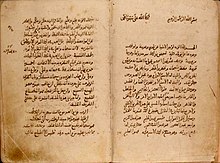Al-Futuhat al-Makkiyya
 | |
| Original title | الفُتُوحَات المكّيّة |
|---|---|
The Meccan Revelations (Arabic: كِتَابُ الفُتُوحَاتِ المَكِّيَّة, romanized: Kitâb Al-Futūḥāt al-Makkiyya)[1] is the major work of the philosopher and Sufi Ibn Arabi, written between 1203 and 1240.

The Andalusi thinker exposes his spiritual journey, his theology, his metaphysics and his mysticism, using sometimes prose, sometimes poetry. The book contains autobiographical elements: encounters, events, and spiritual illuminations.
Structure
The Revelations is a book of 37 volumes, divided into 560 chapters.[2]
Content
The book takes its title from the holy city of Mecca, to which Ibn Arabi travelled on pilgrimage in 1202, and in which he received a number of revelations of divine origin.
In the Illuminations Ibn Arabi develops a theory of the imagination and the imaginary world explained by Henry Corbin.[3] There is also a psychological and religious description of the effects of Allah's Love (in both the subjective and objective sense of expression).
According to Michel Chodkiewicz, this book occupies a particularly important place in Ibn Arabi's work because it represents "the ultimate state of his teaching in its most complete form".[4]
Women, poetry, religious love
Women are prominently featured in the book, particularly in Chapter 178 on love. Ibn Arabi is initiated into religious experience by a spiritual woman called Nizham, a young Iranian woman whose name means "Harmony". He quotes the poems of the writer Rabia of Basra, who according to him is "the most prestigious interpreter" of love.[5] Ibn Arabi also recounts his encounter and service to mystic Fatima bint al-Muthanna, with whom he recites Al Fātiḥah (the first surah of the Quran) and whose degree of spiritual elevation he admires.[6]
Legacy
The Illuminations are a classic of Sufism, theology and Islamic philosophy. They influenced the "Spiritual Writings" of the emir Abd el-Kader, who published the book in 1857, and perhaps Dante.[7]. Henry Corbin compared Dante's Béatrice, which leads the poet to paradise in the Divine Comedy and awakens him to love in the Vita Nuova, to Ibn Arabi's Nizhâm, a mystical woman who initiates the Andalusian philosopher to the experience of God's love.[8]
References
- ^ Introduction to The Meccan Revelations on Ibnarabisociety
- ^ Constant Hamès, Ibn Arabî, Les Illuminations de La Mecque (compte rendu), Archives de sciences sociales des religions, 1990, Vol. 72, N°1, p. 266-267.
- ^ Henry Corbin, L'imagination créatrice dans le soufisme d'Ibn Arabi.
- ^ Michel Chodkiewicz (1997). Avant-propos in Les Illuminations de La Mecque (in French). Paris: Albin Michel. p. 10..
- ^ Treaty of Love, p. 247.
- ^ Traité de l'amour, p. 188-190.
- ^ The hypothesis of Ibn Arabi's influence on Dante comes from Miguel Asin Palacios See « After Ibn Arabi ».
- ^ Florian Besson, "Ibn Arabî", Les Clés du Moyen Orient, 1 April 2013.
Bibliography
- Partial editions
- Anthology: Les Illuminations de La Mecque, Paris, Éditions Albin Michel, 2008 (1988), Spiritualités vivantes , trans. Michel Chodkiewicz.
- Anthology: Les Révélations de La Mecque, Paris, Entrelacs, 2009, trans. Abdallah Penot.
- Two chapters in: Par-delà le miroir, Paris, Entrelacs, 2012, "Hikma", trans. Abdallah Penot.
- Chapters 61 to 65: De la mort à la résurrection, Paris, Albouraq, 2009, trans. Maurice Gloton.
- Chapter 167: L'Alchimie du Bonheur parfait, Paris, Berg International, 1981, trans. Stéphane Ruspoli.
- Chapitre 178 : Traité de l'amour, Paris, Albin Michel, 1986, "Spiritualités vivantes", trans. Maurice Gloton.
- Studies
- Claude Addas, Expérience et doctrine de l'amour chez Ibn Arabî, in Mystique musulmane (collective work), Paris, Cariscript, 2002.
- Henry Corbin, L'imagination créatrice dans le soufisme d'Ibn Arabi, Paris, Flammarion, 1958, reprint Flammarion-Aubier, 1993.
- George Grigore, Le concept d’amour chez Ibn 'Arabi, "Romano-Arabica", II, Bucharest: Center for Arab Studies. 2002; p. 119-134.
